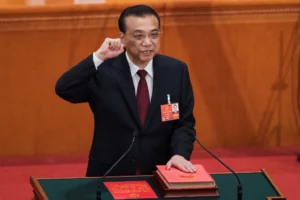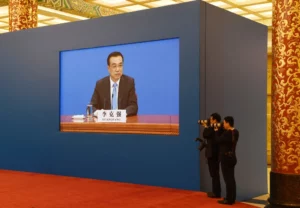After all efforts to assist the former premier revealed ineffective, Li is said to have died at 0:10 on 27 October in Shanghai at the age of 68. Xinhua News Agency said the obituary was issued later.
Li was a member of the 15th to 19th Central Committee of the Communist Party of China, a member of the 17th to 19th Political Bureau of the Central Committee, a member of the Standing Committee, and a member of the 8th Standing Committee of the National People’s Congress.
The son of a minor party official in eastern China’s poor Anhui province, Li was sent to the countryside to work as a manual labourer during the tumultuous Cultural Revolution of 1966 to 1976. He went on to gain a law degree from Peking University, where classmates say he embraced Western and liberal political theory, translating a book on the law by a British judge.
But he became more orthodox after joining the ranks of officialdom in the mid-1980s, working as a bureaucrat while his former classmates protested in Tiananmen Square in 1989. Li rose to become the ruling Communist Party’s top official in Henan province, and in Liaoning in the northeast — both of which saw economic growth.
But his reputation was damaged by his handling of an HIV/AIDS epidemic stemming from a tainted blood donation programme while he was party boss in Henan. Later, Li was promoted to become a deputy to then-premier Wen Jiabao. His attempts at tackling China’s deep economic challenges were curtailed by the overwhelming authority of Xi, with whom he was once seen as a rival for the country’s leadership.

The son of a minor party official in eastern China’s poor Anhui province, Li was sent to the countryside to work as a manual labourer during the tumultuous Cultural Revolution of 1966 to 1976 (Photo by NICOLAS ASFOURI / AFP)
Praised for helping to steer the country through the global financial crisis relatively unscathed, his time in office saw a dramatic shift in power in China from the more consensus-based rule associated with former leader Hu Jintao and his predecessors, to the more concentrated power of Xi.
“People always debated whether (China’s) institutions would… determine the outcomes, as opposed to just raw power,” Victor Shih, an expert on China’s elite politics at the University of California San Diego, told AFP. “And of course, recent events show that raw power still matters more.”
– ‘Derailed agenda’ –
Li‘s tenure also saw China’s economy begin to slow from the dizzying heights experienced in the 1990s and 2000s.
“He always struck me as very committed to China’s development, intellectually curious, with a highly sophisticated understanding of the Chinese economy,” Bert Hofman, director of the East Asian Institute at the National University of Singapore, told AFP.
“Events derailed some of his agenda in the past 10 years, but his thinking is still very much relevant today.” Former Peking University classmate Guoguang Wu, now a senior research scholar at Stanford, told AFP that Li “was someone with an ability for independent thought” during their time together.

When Li left office, the country was experiencing some of its lowest growth in decades, battered by a Covid-induced slowdown and a crisis in the housing market. (Photo by GREG BAKER / AFP)
“Afterwards, he became a government official, and this ability seemed to disappear,” he said. “I don’t believe he has left a political legacy. History will soon forget him.”
When Li left office, the country was experiencing some of its lowest growth in decades, battered by a Covid-induced slowdown and a crisis in the housing market. The appointment of Xi ally Li Qiang — a former Shanghai party boss — as his successor this year was seen as a sign that his reformist agenda had fallen by the wayside as Beijing tightens its grip over its slowing economy.
But in his final speech as outgoing premier, Li struck a bullish tone, saying China’s economy was “staging a steady recovery and demonstrating vast potential and momentum for further growth”. “Overcoming great difficulties and challenges, we succeeded in maintaining overall stable economic performance.”
Plataforma with Xinhua and AFP



